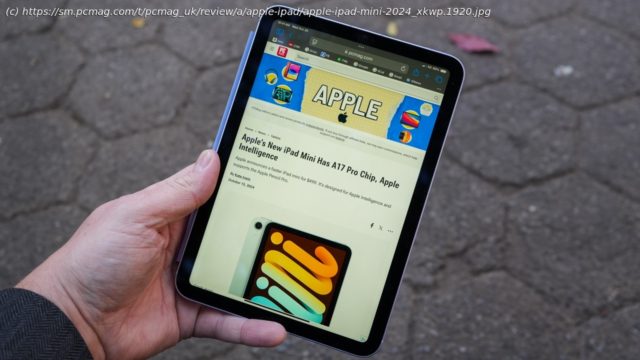Apple’s smallest tablet gets Apple Intelligence
The iPad mini (starting at $499) gains a peppy processor for 2024, but Apple stops short of giving it the more drastic overhaul it deserves. Still, it’s a fine size, it’s well made, it has decent battery life, and it supports Apple Intelligence and the Apple Pencil Pro. If Apple’s other tablets are simply too large and you specifically want or need an iPad this size, the mini handles gaming, media playback, and light productivity well. Ultimately, the best iPad for most people is the standard $349 iPad thanks to its combination of size, price, and performance, so it remains our Editors‘ Choice. Design: Nothing New
Apple’s tablet lineup includes four iPads: the iPad Pro, the iPad Air, the iPad, and the iPad mini. The Pro and Air models are available in 11- and 13-inch sizes, while the standard iPad has a 10.9-inch screen, and the mini has an 8.3-inch screen. They all share the same basic design, which has remained largely unchanged for the last few upgrade cycles.
The design consists of a large piece of glass set in an aluminum chassis with rounded corners and flat side edges. It’s a simple but classy look, and the materials are (as always) of the highest quality. This year, the mini is available in four colors: Blue, Purple, Space Gray, or Starlight. I received the Purple model for testing.
The iPad mini measures 7.69 by 5.30 by 0.25 inches (HWD) and weighs 0.65 pounds. It’s by far the easiest iPad to hold and use. Surely, the smaller hands of younger users will find it comfortable. It’s also the easiest to toss in a bag to carry around town. I was able to cram it into my compact camera bag and lug it around Manhattan for a full day of meetings. Importantly, my shoulder wasn’t begging for mercy when I returned home.
The rest of the iPad lineup is larger and heavier. The $999 11-inch iPad Pro measures 9.83 by 6.99 by 0.21 inches and weighs 0.98 pounds, while the $1,299 13-inch model is even bigger at 11.09 by 8.48 by 0.20 inches and 1.28 pounds. Meanwhile, the $599 11-inch iPad Air (9.74 by 7.02 by 0.24 inches, 1.02 pounds) and the $799 13-inch iPad Air (11.04 by 8.46 by 0.24 inches, 1.36 pounds) are close to the Pro models in size and weight. Last, the standard iPad measures 9.79 by 7.07 by 0.28 inches and weighs 1.05 pounds.
The 11-inch models fit in larger purses and slings, messenger bags, and backpacks, but the 13-inch models need a more sizable bag for lugging about. If devices with 8-inch screens are your sweet spot, alternatives include Amazon’s line of Fire tablets, like the $99.99 Fire HD 8 (7.94 by 5.40 by 0.37 inches, 0.74 pounds), but it’s not nearly as capable as the iPad mini in any regard.
Apple keeps the controls and other basics unchanged. For example, the volume buttons and the combined power/Touch ID button sit on one short edge. These buttons have fantastic travel and feedback, but I would have preferred to see the mini adopt Face ID for facial recognition. Touch ID is incredibly reliable, but Face ID is often faster and more convenient than a button that moves every time you rotate the tablet. I registered four prints with the mini so I always had one resting near the scanner.
The USB-C port is on the opposing short edge and is joined by speaker grilles. You’ll get better data transfer speeds from this port, which Apple upgrades to USB 3 with support for 10Gbps. The physical SIM card tray is gone from the side edge of the cellular model in favor of eSIM. The 5G antenna is plainly visible on one side. The camera module contains a single lens, microphone, and flash and is tucked into the upper left corner of the rear panel. The Apple logo is large, chromed out, and reflective. There are no pogo pins for connecting to accessories like a keyboard.
Apple’s iPads are not waterproof, so keep the mini away from the pool. They’re not dustproof either, so best to leave the iPad at home when you go to the beach. If any iPad in Apple’s lineup should have an IP rating, it’s this one. It can be slippery, too, so it’s best to get some sort of folio or case.
The iPad mini’s small size is its biggest feature. It’s a perfect travel companion and would be a great tool to have on a trip where carrying a larger tablet or laptop would be cumbersome.Display: Sticking With LCD
The mini’s screen appears to be a direct carryover from the 2021 iPad mini. It is an LED LCD that measures 8.3 inches across the diagonal with 2,266 by 1,488 pixels for a density of 326 pixels per inch. That’s actually sharper than all the other iPad displays, which have a pixel density of 264ppi. The standard iPad and iPad Air also use LCDs, while the Pro models upgrade to OLED. It would be nice to see OLED trickle down to the more affordable iPads one day.
The screen is fully laminated and has anti-reflective and fingerprint-resistant oleophobic coatings. The brightness tops out at 500 nits when viewing SDR content. It also supports True Tone for automatic white balance adjustments and wide color (P3). It’s a better display than that of the standard iPad, which lacks special coatings, and it matches the quality of the iPad Air. I was able to use it outdoors under full sunlight with little glare and easy visibility.
It relies on a standard 60Hz refresh rate that matches the iPad and iPad Air but not the variable ProMotion refresh rate (up to 120Hz) of the iPad Pro. Jelly scrolling, or uneven banding that appears when you slide content up and down the screen, was a major issue for the last iPad mini.






